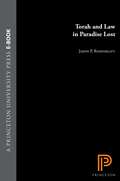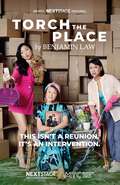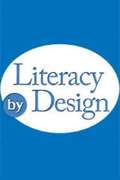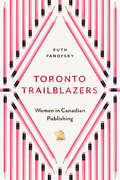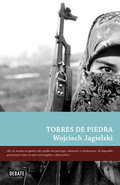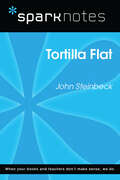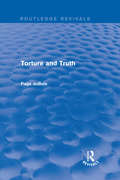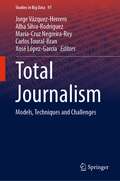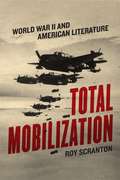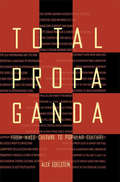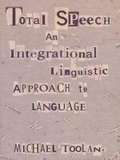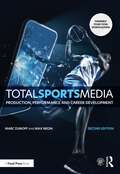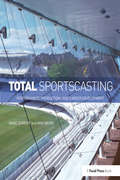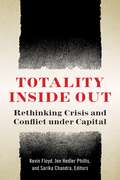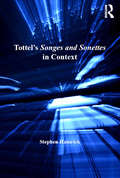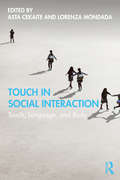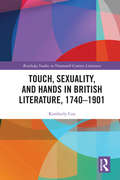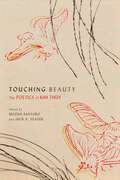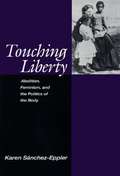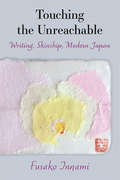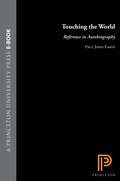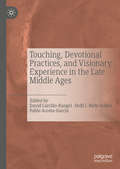- Table View
- List View
Torah and Law in Paradise Lost
by Jason P. RosenblattIt has been the fate of Milton, the most Hebraic of the great English poets, to have been interpreted in this century largely by those inhospitable to his Hebraism. To remedy this lack of balance, Jason Rosenblatt reveals Milton's epic representations of paradise and the fallen world to be the supreme coordinates of an interpretive struggle, in which Jewish beliefs that the Hebrew Bible was eternally authoritative Torah were set against the Christian view that it was a temporary law superseded by the New Testament. Arguing that the Milton of the 1643-1645 prose tracts saw the Hebrew Bible from the Jewish perspective, Rosenblatt shows that these tracts are the principal doctrinal matrix of the middle books of Paradise Lost, which present the Hebrew Bible and Adam and Eve as self-sufficient entities.Rosenblatt acknowledges that later in Paradise Lost, after the fall, a Pauline hermeneutic reduces the Hebrew Bible to a captive text and Adam and Eve to shadowy types. But Milton's shift to a radically Pauline ethos at that point does not annul the Hebraism of the earlier part of the work. If Milton resembles Paul, it is not least because his thought could attain harmonies only through dialectic. Milton's poetry derives much of its power from deep internal struggles over the value and meaning of law, grace, charity, Christian liberty, and the relationships among natural law, the Mosaic law, and the gospel.
Torch the Place: MTC NEXTSTAGE ORIGINAL
by Benjamin LawTeresa's mum finds it impossible to let anything go-from grudges to household objects. She thinks of her home as a museum full of irreplaceable treasures. But she's not really a curator, she's a hoarder, and her house is enough to give Marie Kondo heart palpitations. When her kids return home to celebrate her 60th birthday, she's over the moon to have the family back together. But this isn't a reunion. It's an intervention. Celebrated writer Benjamin Law is one of this country's brightest literary stars. For his hysterically funny and moving stage premiere, Law employs his effortless self-deprecating wit to spark joy in the clutter and find truth in those crazy moments that bring families closer together. Commissioned through MTC's NEXT STAGE Writers' Program with the support of our Playwrights Giving Circle Donors, The Ian Potter Foundation, Naomi Milgrom Foundation, The Myer Foundation, Malcolm Robertson Foundation and The University of Melbourne.
Tornado
by National Geographic SocietyPete's dog, Tornado, was no ordinary dog. He came in a Tornado, but when his real owners see him, will Pete lose Tornado?
Toronto Trailblazers: Women in Canadian Publishing (Studies in Book and Print Culture)
by Ruth PanofskyThe first-ever study of women in Canadian publishing, Toronto Trailblazers delves into the cultural influence of seven key women who, despite pervasive gender bias, helped advance a modern literary culture for Canada. Publisher Irene Clarke, scholarly editors Eleanor Harman and Francess Halpenny, trade editors Sybil Hutchinson, Claire Pratt, and Anna Porter, and literary agent Bella Pomer made the most of their vocational prospects, first by securing their respective positions and then by refining their professional methods. Individually, each woman asserted her agency by adapting orthodox ways of working within Canadian publishing. Collectively, and perhaps more importantly, their overarching approach emerged more broadly as a feminist practice. Guided by the resolve to make industry-wide improvements, these women disrupted the dominant masculine paradigm and reinvigorated the culture of publishing and authorship in Canada. Through their vision and method these trailblazing women became agents of change who helped transform publishing practice.
Torres de piedra
by Wojciech JagielskiUna impresionante crónica de Wojciech Jagielski sobre la guerra chechena. «En un mundo en guerra solo puedes ser partícipe, voluntario o involuntario. Es imposible permanecer como un mero investigador u observador.» Torres de piedra es un extraordinario reportaje de Wojciech Jagielski sobre uno de los lugares más trágicos y desconocidos del planeta: Chechenia. Los abundantes recursos petrolíferos y el derrumbe de la Unión Soviética en 1991 alimentaron las aspiraciones independentistas de la población chechena y desembocaron en dos sangrientas guerras contra Rusia que se saldaron con más de 150.000 muertos. Este libro retrata la segunda de ellas, iniciada en 1999 como maniobra política para asegurar la elección como presidente de Rusia de un entonces desconocido ex miembro del KGB: Vladímir Putin y cerrada en falso en 2002, con un gobierno títere incapaz de controlar las zonas rebeldes gobernadas por la ley del más fuerte. Jagielski retrata magistralmente Chechenia, sus habitantes y la cruel guerra sostenida por un puñado de guerrilleros desesperados contra el poderoso ejército ruso. Su narración se estructura en torno a los protagonistas principales del conflicto, dos hombres que se lo deben todo a esta guerra: Shamil Basáyev, héroe para algunos y peligroso señor de la guerra para otros, y Aslán Masjádov, un político soberbio y calculador, salvador providencial para una parte de sus compatriotas y cobarde oportunista para el resto. La guerra librada por ambos contra las fuerzas enemigas y sus irresolubles conflictos proporcionan al autor un valiosísimo material sobre el que construir una espléndida y conmovedora alegoría acerca de la guerra y la irreversibilidad de las buenas y malas elecciones. Reseñas:«Este libro de Jagielski alcanza un nuevo nivel en el grupo de descarnadas crónicas sobre uno de los rincones más olvidados de la antigua Rusia y sobre los espantosos daños infligidos a los chechenos tanto por los líderes extranjeros como por los autóctonos. En este relato, las miserias, desgracias y peligros de la cotidianeidad chechena cobran vida con una claridad insoportable.»The Economist «Los reportajes de Wojciech Jagielski ya han sido muy elogiados. Su trabajo más reciente confirmará esa reputación.»Ryszard Kapuscinski
Tortilla Flat (SparkNotes Literature Guide Series)
by SparkNotesTortilla Flat (SparkNotes Literature Guide) by John Steinbeck Making the reading experience fun! Created by Harvard students for students everywhere, SparkNotes is a new breed of study guide: smarter, better, faster. Geared to what today's students need to know, SparkNotes provides: *Chapter-by-chapter analysis *Explanations of key themes, motifs, and symbols *A review quiz and essay topicsLively and accessible, these guides are perfect for late-night studying and writing papers
Torture and Truth (New Ancient World Ser.)
by Page duBoisFirst published in 1991, this book — through the examination of ancient Greek literary, philosophical and legal texts — analyses how the Athenian torture of slaves emerged from and reinforced the concept of truth as something hidden in the human body. It discusses the tradition of understanding truth as something that is generally concealed and the ideas of ‘secret space’ in both the female body and the Greek temple. This philosophy and practice is related to Greek views of the ‘Other’ (women and outsiders) and considers the role of torture in distinguishing slave and free in ancient Athens. A wide range of perspectives — from Plato to Sartre — are employed to examine the subject.
Total Journalism: Models, Techniques and Challenges (Studies in Big Data #97)
by Xosé López-García Jorge Vázquez-Herrero Alba Silva-Rodríguez Carlos Toural-Bran María-Cruz Negreira-ReyThis book aims to explore the diverse landscape of journalism in the third decade of the twenty-first century, constantly changing and still dealing with the consequences of a global pandemic. ‘Total journalism’ is the concept that refers to the renewed and current journalism that employs all available techniques, technologies, and platforms.Authors discuss the innovative nature of journalism, the influence of big data and information disorders, models, professionals and audiences, as well as the challenges of artificial intelligence. The book gives an up-to-date overview of these perspectives on journalistic production and distribution. The effects of misinformation and the challenge of artificial intelligence are of specific relevance in this book.Readers can enjoy with contributions from prestigious experts and researchers who make this book an interesting resource for media professionals and researchers in media and communication studies.
Total Mobilization: World War II and American Literature
by Roy ScrantonSince World War II, the story of the trauma hero—the noble white man psychologically wounded by his encounter with violence—has become omnipresent in America’s narratives of war, an imaginary solution to the contradictions of American political hegemony. In Total Mobilization, Roy Scranton cuts through the fog of trauma that obscures World War II, uncovering a lost history and reframing the way we talk about war today. Considering often overlooked works by James Jones, Wallace Stevens, Martha Gellhorn, and others, alongside cartoons and films, Scranton investigates the role of the hero in industrial wartime, showing how such writers struggled to make sense of problems that continue to plague us today: the limits of American power, the dangers of political polarization, and the conflicts between nationalism and liberalism. By turning our attention to the ways we make war meaningful—and by excavating the politics implicit within the myth of the traumatized hero—Total Mobilization revises the way we understand not only World War II, but all of postwar American culture.
Total Propaganda: From Mass Culture To Popular Culture (Routledge Communication Series)
by Alex S. EdelsteinBLURB FOR TOTAL PROP MAILER................ Total Propaganda moves the study of propaganda out of the exclusive realm of world politics into the more inclusive study of popular culture, media, and politics. All the participatory functioning elements of the society are aspects of membership in the popular culture. Thus, the values of popular music, media, politics, debates over social issues, and even international trade become everyday propaganda to which everyone may relate. To emphasize the necessity for new thinking about propaganda, Edelstein creates the concepts of the new propaganda and the old, and he devises a language of "uninyms" to convey their meanings more quickly. "Oldprop" is characteristic of mass cultures and utilizes totalitarian methods of conflict, hegemony, minimization, demonization, and exclusiveness to achieve its goals. By contrast, "newprop" is created by members of the popular culture to allow them to engage in accomodation, enhance the individual, and promote inclusiveness. Shifts in the old and the new propaganda are tracked across social issues such as race, religion, sexuality, gender, gun control, and the environment, as well as in fashion, politics, advertising, sports, media, and politics. Central to the concept of total propaganda is that it is not simply additive; it is the product of new energies that are produced by the fusing of propaganda in such related forums as music, art, advertising, sports and politics. It is these synergies, and their production of new energies, that make total propaganda greater than the sum of its parts. Edelstein concludes that the most important distinction that should be drawn between mass culture and popular culture is its text; i.e., its propaganda. In a popular culture, everyone creates and consumes propaganda; in a mass culture almost everyone consumes it but only a few create it. This formulation offers new ways to discuss power and ideology in media texts. As an example, where once the least informed and the least educated were the most subject to propaganda, now the most informed and most educated often are the first to create propaganda and the first to consume it. FORMER BLURB COPY.......It is widely recognized that the mass media provide us with ample information which we use to construct some sense of the world around us. It is not as widely recognized that consumers of media messages are active in this constructive process, making meanings that are sensible to them in particular life circumstances. The media target a younger, more media savvy generation who are more likely to be participants in the messages than members of any previous generation. This participatory aspect of new media is central to what the author defines as the new propaganda. Although critical and cultural theories are often prohibitive for undergraduate students, the author's formulation offers an accessible way to discuss power and ideology in media texts. Without using the critical discourse, he provides compelling arguments that power and ideology are created and maintained through the active participation of audience members. The conceptualization of the old and new propagandas helps move the study of propaganda out of the realm of world politics into the study of popular culture. The author views all of the participatory functioning of the society as aspects of membership in a more embracing popular culture. This point of view recognizes that the mass media are extremely important forces in the consumer's construction of reality and that they are no longer exclusive channels for disseminating the messages of the powerful elites. Instead, the media -- particularly the new media -- are accessible to and used frequently by less powerful members of society -- children, ethnic minorities, and marginal members of society -- to create realities that more satisfactorily fulfill their needs. NEW BLURB COPY FOR GENERAL CATALOGS... Total Propaganda is a fresh answer to the question of the inclusiveness of the popular culture. It demonstrates how the values of popular
Total Speech: An Integrational Linguistic Approach to Language
by Michael ToolanUnits, rules, codes, systems: this is how most linguists study language. Integrationalists such as Michael Toolan, however, focus instead on how language functions in seamless tandem with the rest of human activity. In Total Speech, Toolan provides a clear and comprehensive account of integrationalism, a major new theory of language that declines to accept that text and context, language and world, are distinct and stable categories. At the same time, Toolan extends the integrationalist argument and calls for a radical change in contemporary theorizing about language and communication.In every foundational area of linguistics--from literal meaning and metaphor to the nature of repetition to the status of linguistic rules--Toolan advances fascinating and provocative criticisms of received linguistic assumptions. Drawing inspiration from the writings of language theorist Roy Harris, Toolan brings the integrationalist perspective to bear on legal cases, the reception of Salman Rushdie, poetry, and the language of children. Toolan demonstrates that the embeddedness of language and the situation-sensitive mutability of meaning reveal language as a tool for re-fashioning and renewal.Total Speech breaks free of standard linguistics' fascinated attraction with "cognitive blueprints" and quasi-algorithmic processing to characterize language anew. Toolan's reflections on the essence of language, including his important discussion of intention, have strong implications for students and scholars of discourse analysis, literature, the law, anthropology, philosophy of language, communication theory, and cognitive science, as well as linguistics.
Total Sports Media: Production, Performance and Career Development
by Max Negin Marc ZumoffThis thoroughly revised second edition of Total Sports Media (formerly Total Sportscasting) offers a complete guide to sports media across TV, radio and digital broadcasting. Covering everything from practical skills to industry lingo, this book guides readers through each aspect of the sportscasting process, including performance and production techniques, demo reel production, and writing for sports media. Chapters feature interviews with successful sports media professionals who take you inside the real-world practices of the industry, offering invaluable insights on how to carve out a career in the field and forge lasting relationships with team personnel. New to this edition are a discussion of changes in the industry as a result of the Covid-19 pandemic, updated sections on career paths and professional development opportunities, and an updated chapter on social media strategies for sportscasters. This book also delves into the unique issues facing women and minority sportscasters. Finally, the authors look at the history of sports media and discuss the future of the industry. Total Sports Media is an essential resource for both students and instructors of sports media, as well as for industry professionals interested in a wide-reaching look at this changing field. A companion website features additional resources for instructors and students, including video and audio examples and links to additional resources.
Total Sportscasting: Performance, Production, and Career Development
by Max Negin Marc ZumoffWhether you want to be in front of the camera, on the microphone, or behind the scenes, Total Sportscasting gives you the skills you'll need to become successful in this dynamic industry. This book covers everything from performance and production techniques to all aspects of sportscasting, good broadcast writing techniques, and how best to forge lasting relationships with team personnel. It also delves into the unique issues facing women sportscasters. And when it comes to breaking into the business, Total Sportscasting devotes entire chapters to career development and demo reel production. For important perspective, we've also included chapters on the history of sportscasting and attempts to glimpse into its future. Total Sportscasting is packed with a variety of features for both learning and instructing: Complete coverage of every aspect of the sportscast, helping you prepare for any platform--TV, radio, and the web Interviews with successful sports journalists, producers, and directors who give you an inside look into the real-world practices of the industry A companion website, which provides additional resources for both instructors and students, including video and audio examples and links to additional resources: www.totalsportscasting.com
Totality Inside Out: Rethinking Crisis and Conflict under Capital
by Kevin Floyd, Jen Hedler Phillis, and Sarika ChandraHowever divergent their analyses may be in other ways, some prominent anti-capitalist critics have remained critical of contemporary debates over reparative justice for groups historically oppressed and marginalized on the basis of race, gender, sexual identity, sexual preference, and/or ability, arguing that the most these struggles can hope to produce is a more diversity-friendly capital. Meanwhile, scholars of gender and sexuality as well as race and ethnic studies maintain that, by elevating the socioeconomic above other logics of domination, anti-capitalist thought fails to acknowledge specific forms and experiences of subjugation.The thinkers and activists who appear in Totality Inside Out reject this divisive logic altogether. Instead, they aim for a more expansive analysis of our contemporary moment to uncover connected sites of political struggle over racial and economic justice, materialist feminist and queer critique, climate change, and aesthetic value. The re-imagined account of capitalist totality that appears in this volume illuminates the material interlinkages between discrepant social phenomena, forms of oppression, and group histories, offering multiple entry points for readers who are interested in exploring how capitalism shapes integral relations within the social whole.Contributors: Brent Ryan Bellamy, Sarah Brouillette, Sarika Chandra, Chris Chen,Joshua Clover, Tim Kreiner, Arthur Scarritt, Zoe Sutherland, Marina Vishmidt
Tottel's Songes and Sonettes in Context (Material Readings in Early Modern Culture)
by Stephen HamrickThough printer Richard Tottel’s Songes and Sonettes (1557) remains the most influential poetic collection printed in the sixteenth century, the compiliation has long been ignored or misundertood by scholars of early modern English culture. Embracing a broad range of critical and historical perspectives, the eight essays within this volume offer the first sustained analysis of the many ways that consumers read and understood Songes and Sonettes as an anthology over the course of the early modern period. Copied by a monarch, set to music, sung, carried overseas, studied, appropriated, rejected, edited by consumers, transferred to manuscript, and gifted by Shakespeare, this muti-author verse anthology of 280 poems transformed sixteenth-century English language and culture. With at least eleven printings before the end of Elizabeth I’s reign, Tottel’s ground-breaking text greatly influenced the poetic publications that followed, including individual and multi-author miscellanies. Contributors to this essay collection explore how, in addition to offering a radically new kind of English verse, ’Tottel’s Miscellany’ engaged politics, friendship, religion, sexuality, gender, morality and commerce in complex-and at times, contradictory-ways.
Touch a Dream
by Harcourt School Publishers StaffEverybody has a dream. Some dreams are simple; some are grand. Dreams are those special hopes that we aim for. What's your dream? In Touch a Dream, you will read about people reaching for their biggest goals and making them happen. Some of these people travel to new lands to study rare plants and animals, or to find a new home. Others simply plant a small garden in their city neighborhood. You'll discover some people who help those around them, while others strive to meet their own goals. Every time you read a different story, you will discover a new dream.
Touch and Intimacy in First World War Literature
by Santanu DasWar writing is haunted by experiences of physical contact: from the muddy realities of the front to the emotional intensity of trench life. Through extensive archival and historical research, analyzing previously unknown letters and diaries alongside literary writings by figures such as Owen and Brittain, Santanu Das recovers the sensuous world of the First World War trenches and hospitals. This original and evocative study alters our understanding of the period as well as of the body at war, and illuminates the perilous intimacy between sense experience, emotion and language as we try to make meaning in times of crisis.
Touch in Social Interaction: Touch, Language, and Body
by Lorenza Mondada Asta CekaiteRooted in multimodal conversation analysis and based on video recordings of naturally occurring social interactions, this book presents a novel analytical perspective for the study of touch. The authors focus on how different forms of touch are interactionally organized in everyday, institutional, and professional practices, showing how touch is multimodally achieved in social interaction, how it acquires its significance, how it is embedded in the current activity and in its social context, and how it is systematically intertwined with talk, facial expressions, and body posture. Including work by a wide range of renowned researchers, this volume provides rich visual illustrations of situations featuring touch as a social and intersubjective practice. The studies make a compelling contribution to the field by clearly examining and demonstrating the social meaning of touch for the participants in social interaction in a broad range of contexts. Presenting a new methodology for the study of touch, this is key reading for all researchers and scholars working in conversation analysis, multimodality, and related areas.
Touch, Sexuality, and Hands in British Literature, 1740–1901 (Routledge Studies in Nineteenth Century Literature)
by Kimberly CoxFrom Robert Lovelace’s uninvited hand grasps in Samuel Richardson’s Clarissa to Jane Eyre’s sexual awakening at Edward Rochester’s embrace to Basil Hallward’s first encounter with Dorian Gray, literary depictions of touching hands in British literature from the 1740s to the 1890s communicate emotional dimensions of sexual experience that reflect shifting cultural norms associated with gender roles, sexuality, and sexual expression. But what is the relationship between hands, tactility, and sexuality in Victorian literature? And how do we interpret what those touches communicate between characters? This volume addresses these questions by asserting a connection between the prevalence of violent, sexually charged touches in eighteenth-century novels such as those by Eliza Haywood, Samuel Richardson, and Frances Burney and growing public concern over handshake etiquette in the nineteenth century evident in works by Jane Austen, the Brontës, George Eliot, Elizabeth Gaskell, Thomas Hardy, Oscar Wilde, and Flora Annie Steel. This book takes an interdisciplinary approach that combines literary analysis with close analysis of paintings, musical compositions, and nonfictional texts, such as etiquette books and scientific treatises, to make a case for the significance of tactility to eighteenth- and nineteenth-century perceptions of selfhood and sexuality. In doing so, it draws attention to the communicative nature of skin-to-skin contact as represented in literature and traces a trajectory of meaning from the forceful grips that violate female characters in eighteenth-century novels to the consensual embraces common in Victorian and neo-Victorian literature.
Touching Beauty: The Poetics of Kim Thúy
by Miléna SantoroKim Thúy is a literary phenomenon, rising in her first decade of writing to a level of international recognition that few Québécois writers ever attain. The Vietnamese-born author’s novels have garnered literary prize recognition and have been translated from French into twenty-nine languages in nearly forty countries.Touching Beauty is the first collection to focus solely on Thúy and her economical yet poetic storytelling style that expresses both the traumatic and the beautiful. Her writings, which manage to be culturally specific all while speaking to the fundamentals of the human condition, are examined within the context of what is known as migrant literature in Canada and are situated within the history of Vietnamese literature in French that grew out of the colonial period. Chapters explore food, identity, gender, and the role of writing in Thúy’s life and work. Thúy herself contributes an unpublished poem and an extended interview that focus on her ongoing struggle to find, and write, beauty amidst war, migration, poverty, and loss. Touching Beauty maps the themes that have, to date, animated a literary career of global relevance and enduring value and encourages a deeper appreciation of Thúy’s writing.
Touching Liberty: Abolition, Feminism, and the Politics of the Body
by Karen Sánchez-EpplerIn this study of the pre-Civil War literary imagination, Karen Sánchez-Eppler charts how bodily difference came to be recognized as a central problem for both political and literary expression. Her readings of sentimental anti-slavery fiction, slave narratives, and the lyric poetry of Walt Whitman and Emily Dickinson demonstrate how these texts participated in producing a new model of personhood converged with the sexually distinct and domestically circumscribed female body.
Touching the Unreachable: Writing, Skinship, Modern Japan (Michigan Monograph Series in Japanese Studies #91)
by Fusako InnamiFusako Innami offers the first comprehensive study of touch and skinship—relationality with the other through the skin—in modern Japanese writing. The concept of the unreachable—that is, the lack of characters’ complete ability to touch what they try to reach for—provides a critical intervention on the issue of intimacy. Touch has been philosophically addressed in France, but literature is an effective—or possibly the most productive—venue for exploring touch in Japan, as literary texts depict what the characters may be concerned with but may not necessarily say out loud. Such a moment of capturing the gap between the felt and the said—the interaction between the body and language—can be effectively analyzed by paying attention to layers of verbalization, or indeed translation, by characters’ utterances, authors’ depictions, and readers’ interpretations. Each of the writers discussed in this book—starting with Nobel prize winner Kawabata Yasunari, Tanizaki Jun’ichiro, Yoshiyuki Junnosuke, and Matsuura Rieko—presents a particular obsession with objects or relationality to the other constructed via the desire for touch. In Touching the Unreachable, phenomenological and psychoanalytical approaches are cross-culturally interrogated in engaging with literary touch to constantly challenge what may seem like the limit of transferability regarding concepts, words, and practices. The book thereby not only bridges cultural gaps beyond geographic and linguistic constraints, but also aims to decentralize a Eurocentric hegemony in its production and use of theories and brings Japanese cultural and literary analyses into further productive and stimulating intellectual dialogues. Through close readings of the authors’ treatment of touch, Innami develops a theoretical framework with which to examine intersensorial bodies interacting with objects and the environment through touch.
Touching the World: Reference in Autobiography
by Paul John EakinPaul John Eakin's earlier work Fictions in Autobiography is a key text in autobiography studies. In it he proposed that the self that finds expression in autobiography is in fundamental ways a kind of fictive construct, a fiction articulated in a fiction. In this new book Eakin turns his attention to what he sees as the defining assumption of autobiography: that the story of the self does refer to a world of biographical and historical fact. Here he shows that people write autobiography not in some private realm of the autonomous self but rather in strenuous engagement with the pressures that life in culture entails. In so demonstrating, he offers fresh readings of autobiographies by Roland Barthes, Nathalie Sarraute, William Maxwell, Henry James, Ronald Fraser, Richard Rodriguez, Henry Adams, Patricia Hampl, John Updike, James McConkey, and Lillian Hellman. In the introduction Eakin makes a case for reopening the file on reference in autobiography, and in the first chapter he establishes the complexity of the referential aesthetic of the genre, the intricate interplay of fact and fiction in such texts. In subsequent chapters he explores some of the major contexts of reference in autobiography: the biographical, the social and cultural, the historical, and finally, underlying all the rest, the somatic and temporal dimensions of the lived experience of identity. In his discussion of contemporary theories of the self, Eakin draws especially on cultural anthropology and developmental psychology.
Touching, Devotional Practices, and Visionary Experience in the Late Middle Ages
by David Carrillo-Rangel Delfi I. Nieto-Isabel Pablo Acosta-GarcíaThis book addresses the history of the senses in relation to affective piety and its role in devotional practices in the late Middle Ages, focusing on the sense of touch. It argues that only by deeply analysing this specific context of perception can the full significance of sensory religious experience in the Late Middle Ages be understood. Considering the centrality of the body to medieval society and Christianity, this collection explores a range of devotional practices, mainly relating to the Passion of Christ, and features manuscripts, works of devotional literature, art, woodcuts and judicial records. It brings together a multidisciplinary group of scholars to offer a variety of methodological approaches, in order to understand how touch was encoded, evoked and purposefully used. The book further considers how touch was related to the medieval theory of perception, examining its relation to the inner and outer senses through the eyes of visionaries, mystics, theologians and confessors, not only as praxis but from different theoretical points of view. While considered the most basic of spiritual experience, the chapters in this book highlight the all-pervasive presence of touch and the significance of ‘affective piety’ to Late Medieval Christians.Chapter 3: Drama, Performance and Touch in the Medieval Convent and Beyond is Open Access under a CC BY 4.0 license at link.springer.com
